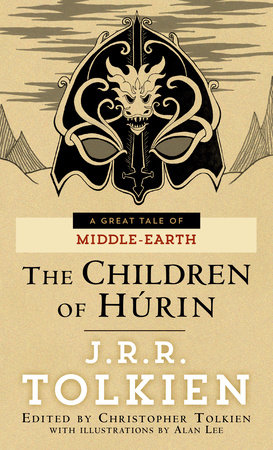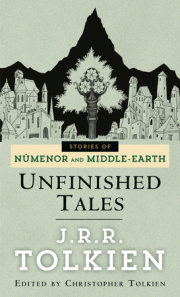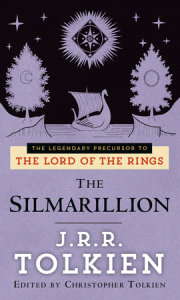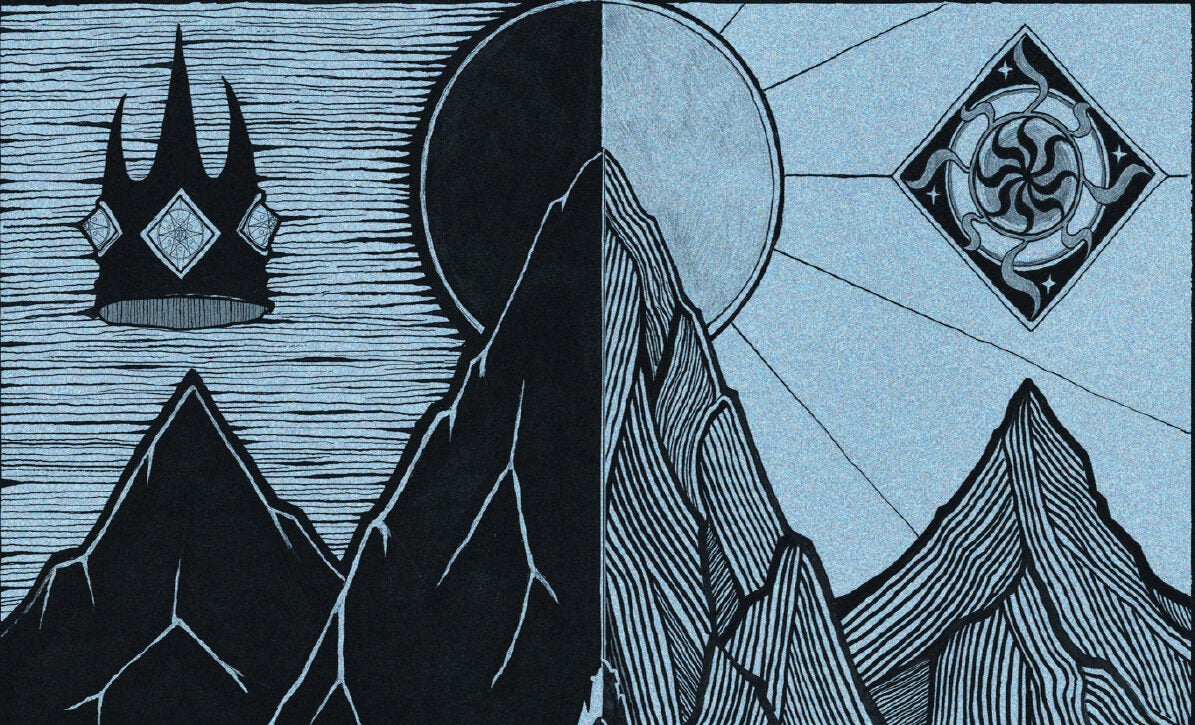Chapter One
THE CHILDHOOD OF TÚRIN
Hador Goldenhead was a lord of the Edain and wellbeloved by the Eldar. He dwelt while his days lasted under the lordship of Fingolfin, who gave to him wide lands in that region of Hithlum which was called Dor-lómin. His daughter Glóredhel wedded Haldir son of Halmir, lord of the Men of Brethil; and at the same feast his son Galdor the Tall wedded Hareth, the daughter of Halmir.
Galdor and Hareth had two sons, Húrin and Huor.
Húrin was by three years the elder, but he was shorter in stature than other men of his kin; in this he took after his mother’s people, but in all else he was like Hador, his grandfather, strong in body and fiery of mood. But the fire in him burned steadily, and he had great endurance of will. Of all Men of the North he knew most of the counsels of the Noldor. Huor his brother was tall, the tallest of all the Edain save his own son Tuor only, and a swift runner; but if the race were long and hard Húrin would be the first home, for he ran as strongly at the end of the course as at the beginning. There was great love between the brothers, and they were seldom apart in their youth.
Húrin wedded Morwen, the daughter of Baragund son of Bregolas of the House of Bëor; and she was thus of close kin to Beren One-hand. Morwen was dark-haired and tall, and for the light of her glance and the beauty of her face men called her Eledhwen, the elven-fair; but she was somewhat stern of mood and proud. The sorrows of the House of Bëor saddened her heart; for she came as an exile to Dorlómin from Dorthonion after the ruin of the Bragollach.
Túrin was the name of the eldest child of Húrin and Morwen, and he was born in that year in which Beren came to Doriath and found Lúthien Tinúviel, Thingol’s daughter. Morwen bore a daughter also to Húrin, and she was named Urwen; but she was called Lalaith, which is Laughter, by all that knew her in her short life.
Huor wedded Rían, the cousin of Morwen; she was the daughter of Belegund son of Bregolas. By hard fate was she born into such days, for she was gentle of heart and loved neither hunting nor war. Her love was given to trees and to the flowers of the wild, and she was a singer and a maker of songs. Two months only had she been wedded to Huor when he went with his brother to the Nirnaeth Arnoediad, and she never saw him again.
But now the tale returns to Húrin and Huor in the days of their youth. It is said that for a while the sons of Galdor dwelt in Brethil as foster-sons of Haldir their uncle, after the custom of Northern men in those days. They often went to battle with the Men of Brethil against the Orcs, who now harried the northern borders of their land; for Húrin, though only seventeen years of age, was strong, and Huor the younger was already as tall as most full-grown men of that people.
On a time Húrin and Huor went with a company of scouts, but they were ambushed by the Orcs and scattered, and the brothers were pursued to the ford of Brithiach. There they would have been taken or slain but for the power of Ulmo that was still strong in the waters of Sirion; and it is said that a mist arose from the river and hid them from their enemies, and they escaped over the Brithiach into Dimbar. There they wandered in great hardship among the hills beneath the sheer walls of the Crissaegrim, until they were bewildered in the deceits of that land and knew not the way to go on or to return. There Thorondor espied them, and he sent two of his Eagles to their aid; and the Eagles bore them up and brought them beyond the Encircling Mountains to the secret vale of Tumladen and the hidden city of Gondolin, which no Man had yet seen.
There Turgon the King received them well, when he learned of their kin; for Hador was an Elf-friend, and Ulmo, moreover, had counselled Turgon to deal kindly with the sons of that House, from whom help should come to him at need. Húrin and Huor dwelt as guests in the King’s house for well nigh a year; and it is said that in this time Húrin, whose mind was swift and eager, gained much lore of the Elves, and learned also something of the counsels and purposes of the King. For Turgon took great liking for the sons of Galdor, and spoke much with them; and he wished indeed to keep them in Gondolin out of love, and not only for his law that no stranger, be he Elf or Man, who found the way to the secret kingdom or looked upon the city should ever depart again, until the King should open the leaguer, and the hidden people should come forth.
But Húrin and Huor desired to return to their own people and share in the wars and griefs that now beset them. And Húrin said to Turgon: ‘Lord, we are but mortal Men, and unlike the Eldar. They may endure for long years awaiting battle with their enemies in some far distant day; but for us the time is short, and our hope and strength soon wither. Moreover we did not find the road to Gondolin, and indeed we do not know surely where this city stands; for we were brought in fear and wonder by the high ways of the air, and in mercy our eyes were veiled.’ Then Turgon granted his prayer, and he said: ‘By the way that you came you have leave to return, if Thorondor is willing. I grieve at this parting; yet in a little while, as the Eldar account it, we may meet again.’
But Maeglin, the King’s sister-son, who was mighty in Gondolin, grieved not at all at their going, though he begrudged them the favour of the King, for he had no love for any of the kindred of Men; and he said to Húrin: ‘The King’s grace is greater than you know, and some might wonder wherefore the strict law is abated for two knavechildren of Men. It would be safer if they had no choice but to abide here as our servants to their life’s end.’ ‘The King’s grace is great indeed,’ answered Húrin, ‘but if our word is not enough, then we will swear oaths to you.’
And the brothers swore never to reveal the counsels of Turgon, and to keep secret all that they had seen in his realm. Then they took their leave, and the Eagles coming bore them away by night, and set them down in Dor-lómin before the dawn. Their kinsfolk rejoiced to see them, for messengers from Brethil had reported that they were lost; but they would not tell even to their father where they had been, save that they were rescued in the wilderness by the Eagles that brought them home. But Galdor said: ‘Did you then dwell a year in the wild? Or did the Eagles house you in their eyries? But you found food and fine raiment, and return as young princes, not as waifs of the wood.’ ‘Be content, father,’ said Húrin, ‘that we have returned; for only under an oath of silence was this permitted. That oath is still on us.’ Then Galdor questioned them no more, but he and many others guessed at the truth. For both the oath of silence and the Eagles pointed to Turgon, men thought.
So the days passed, and the shadow of the fear of Morgoth lengthened. But in the four hundred and sixtyninth year after the return of the Noldor to Middle-earth there was a stirring of hope among Elves and Men; for the rumour ran among them of the deeds of Beren and Lúthien, and the putting to shame of Morgoth even upon his throne in Angband, and some said that Beren and Lúthien yet lived, or had returned from the Dead. In that year also the great counsels of Maedhros were almost complete, and with the reviving strength of the Eldar and the Edain the advance of Morgoth was stayed, and the Orcs were driven back from Beleriand. Then some began to speak of victories to come, and of redressing the Battle of the Bragollach, when Maedhros should lead forth the united hosts, and drive Morgoth underground, and seal the Doors of Angband.
But the wiser were uneasy still, fearing that Maedhros revealed his growing strength too soon, and that Morgoth would be given time enough to take counsel against him. ‘Ever will some new evil be hatched in Angband beyond the guess of Elves and Men,’ they said. And in the autumn of that year, to point their words, there came an ill wind from the North under leaden skies. The Evil Breath it was called, for it was pestilent; and many sickened and died in the fall of the year in the northern lands that bordered on the Anfauglith, and they were for the most part the children or the rising youth in the houses of Men.
In that year Túrin son of Húrin was yet only five years old, and Urwen his sister was three in the beginning of spring. Her hair was like the yellow lilies in the grass as she ran in the fields, and her laughter was like the sound of the merry stream that came singing out of the hills past the walls of her father’s house. Nen Lalaith it was named, and after it all the people of the household called the child Lalaith, and their hearts were glad while she was among them.
But Túrin was loved less than she. He was dark-haired as his mother, and promised to be like her in mood also; for he was not merry, and spoke little, though he learned to speak early and ever seemed older than his years. Túrin was slow to forget injustice or mockery; but the fire of his father was also in him, and he could be sudden and fierce. Yet he was quick to pity, and the hurts or sadness of living things might move him to tears; and he was like his father in this also, for Morwen was stern with others as with herself. He loved his mother, for her speech to him was forthright and plain; but his father he saw little, for Húrin was often long away from home with the host of Fingon that guarded Hithlum’s eastern borders, and when he returned his quick speech, full of strange words and jests and half-meanings, bewildered Túrin and made him uneasy. At that time all the warmth of his heart was for Lalaith his sister; but he played with her seldom, and liked better to guard her unseen and to watch her going upon grass or under tree, as she sang such songs as the children of the Edain made long ago when the tongue of the Elves was still fresh upon their lips.
‘Fair as an Elf-child is Lalaith,’ said Húrin to Morwen; ‘but briefer, alas! And so fairer, maybe, or dearer.’ And Túrin hearing these words pondered them, but could not understand them. For he had seen no Elf-children. None of the Eldar at that time dwelt in his father’s lands, and once only had he seen them, when King Fingon and many of his lords had ridden through Dor-lómin and passed over the bridge of Nen Lalaith, glittering in silver and white.
But before the year was out the truth of his father’s words was shown; for the Evil Breath came to Dor-lómin, and Túrin took sick, and lay long in a fever and dark dream. And when he was healed, for such was his fate and the strength of life that was in him, he asked for Lalaith. But his nurse answered: ‘Speak no more of Lalaith, son of Húrin; but of your sister Urwen you must ask tidings of your mother.’
And when Morwen came to him, Túrin said to her: ‘I am no longer sick, and I wish to see Urwen; but why must I not say Lalaith any more?’
‘Because Urwen is dead, and laughter is stilled in this house,’ she answered. ‘But you live, son of Morwen; and so does the Enemy who has done this to us.’
She did not seek to comfort him any more than herself; for she met her grief in silence and coldness of heart. But Húrin mourned openly, and he took up his harp and would make a song of lamentation; but he could not, and he broke his harp, and going out he lifted up his hand towards the North, crying: ‘Marrer of Middle-earth, would that I might see you face to face, and mar you as my lord Fingolfin did!’ But Túrin wept bitterly at night alone, though to Morwen he never again spoke the name of his sister. To one friend only he turned at that time, and to him he spoke of his sorrow and the emptiness of the house. This friend was named Sador, a house-man in the service of Húrin; he was lame, and of small account. He had been a woodman, and by ill-luck or the mishandling of his axe he had hewn his right foot, and the footless leg had shrunken; and Túrin called him Labadal, which is ‘Hopafoot’, though the name did not displease Sador, for it was given in pity and not in scorn. Sador worked in the outbuildings, to make or mend things of little worth that were needed in the house, for he had some skill in the working of wood; and Túrin would fetch him what he lacked, to spare his leg, and sometimes he would carry off secretly some tool or piece of timber that he found unwatched, if he thought his friend might use it. Then Sador smiled, but bade him return the gifts to their places; ‘Give with a free hand, but give only your own,’ he said. He rewarded as he could the kindness of the child, and carved for him the figures of men and beasts; but Túrin delighted most in Sador’s tales, for he had been a young man in the days of the Bragollach, and loved now to dwell upon the short days of his full manhood before his maiming.
‘That was a great battle, they say, son of Húrin. I was called from my tasks in the wood in the need of that year; but I was not in the Bragollach, or I might have got my hurt with more honour. For we came too late, save to bear back the bier of the old lord, Hador, who fell in the guard of King Fingolfin. I went for a soldier after that, and I was in Eithel Sirion, the great fort of the Elf-kings, for many years; or so it seems now, and the dull years since have little to mark them. In Eithel Sirion I was when the Black King assailed it, and Galdor your father’s father was the captain there in the King’s stead. He was slain in that assault; and I saw your father take up his lordship and his command, though but new come to manhood. There was a fire in him that made the sword hot in his hand, they said. Behind him we drove the Orcs into the sand; and they have not dared to come within sight of the walls since that day. But alas! my love of battle was sated, for I had seen spilled blood and wounds enough; and I got leave to come back to the woods that I yearned for. And there I got my hurt; for a man that flies from his fear may find that he has only taken a short cut to meet it.’
In this way Sador would speak to Túrin as he grew older; and Túrin began to ask many questions that Sador found hard to answer, thinking that others nearer akin should have had the teaching. And one day Túrin said to him: ‘Was Lalaith indeed like an Elf-child, as my father said? And what did he mean, when he said that she was briefer?’ ‘Very like,’ said Sador; ‘for in their first youth the children of Men and Elves seem close akin. But the children of Men grow more swiftly, and their youth passes soon; such is our fate.’
Then Túrin asked him: ‘What is fate?’
‘As to the fate of Men,’ said Sador, ‘you must ask those that are wiser than Labadal. But as all can see, we weary soon and die; and by mischance many meet death even sooner. But the Elves do not weary, and they do not die save by great hurt. From wounds and griefs that would slay Men they may be healed; and even when their bodies are marred they return again, some say. It is not so with us.’
‘Then Lalaith will not come back?’ said Túrin. ‘Where has she gone?’
‘She will not come back,’ said Sador. ‘But where she has gone no man knows; or I do not.’
‘Has it always been so? Or do we suffer some curse of the wicked King, perhaps, like the Evil Breath?’
‘I do not know. A darkness lies behind us, and out of it few tales have come. The fathers of our fathers may have had things to tell, but they did not tell them. Even their names are forgotten. The Mountains stand between us and the life that they came from, flying from no man now knows what.’
‘Were they afraid?’ said Túrin.
‘It may be,’ said Sador. ‘It may be that we fled from the fear of the Dark, only to find it here before us, and nowhere else to fly to but the Sea.’
‘We are not afraid any longer,’ said Túrin, ‘not all of us. My father is not afraid, and I will not be; or at least, as my mother, I will be afraid and not show it.’
It seemed then to Sador that Túrin’s eyes were not the eyes of a child, and he thought: ‘Grief is a hone to a hard mind.’ But aloud he said: ‘Son of Húrin and Morwen, how it will be with your heart Labadal cannot guess; but seldom and to few will you show what is in it.’
Then Túrin said: ‘Perhaps it is better not to tell what you wish, if you cannot have it. But I wish, Labadal, that I were one of the Eldar. Then Lalaith might come back, and I should still be here, even if she were long away. I shall go as a soldier with an Elf-king as soon as I am able, as you did, Labadal.’
Copyright © 2010 by J.R.R. Tolkien. All rights reserved. No part of this excerpt may be reproduced or reprinted without permission in writing from the publisher.










